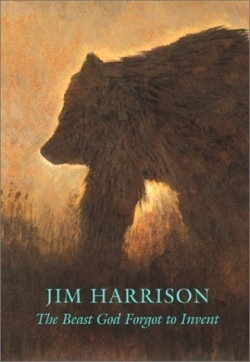The Beast God Forgot to Invent
The title novella of Harrison’s new collection is worth the price of admission itself. The Beast God Forgot to Invent is a fine example of mid-length fiction: engaging, surprising, intelligent and sophisticated in an off-handed way, perceptive and finally moving, with a poignancy that functions on several levels. Set in Michigan’s Upper Peninsula, it’s the tale of a motley crew of caretakers who gather around a vigorous young man whose brain has been damaged in an accident, rendering him both simpler-minded and more virile. Harrison mines an unlikely triangle of Hemingway, Oliver Sacks, and, say, Updike or Cheever, and comes up with gold: a glimpse of a world that seems real and particular, yet shot through with common issues.
This is writing with gravitas, blending humor, wisdom, and tragedy with the sure sense that has won Harrison great acclaim (he is the author of ten works of fiction, including Legends of the Fall, as well as a number of volumes of poetry). Where the title story works wonderfully well, the next two novellas don’t quite live up to the promise of the first. “Westward Ho” is a latter-day picaresque, a Michigan Indian’s odyssey through Los Angeles on the trail of a stolen buffalo skin. Brown Dog, the protagonist, deserves better than the deliberately zany adventures he’s thrust into when he’s shanghaied as driver for an alcoholic screenwriter. The writing itself is first-rate, sentence by sentence, and often laugh-out-loud funny, but the slapstick satire is directed at such dead-horse targets as Hollywood excess, star wannabes, and political hypocrisy, and Brown Dog, as a Native American Candide, veers wildly between Gumpish naïvete—he thinks a woman he sees in an X-rated movie is a genuine star, for example—and knowing repartee: when his boss asks him what he’s doing, he replies, “I just finished my yoga and I’m doing my hair.” It’s a mix that doesn’t quite gel—at least to A-list Harrison standard. Finally, “I Forgot to Go to Spain” tells the story of a commercially successful writer confronting several roads not taken. Played out mainly in Manhattan with a momentous trip to Chicago and Midwestern heartland, it’s often wise, ruefully sophisticated, and authentically witty, but again the characters seem a little too colorful, too convenient to be quite real. Even with these caveats, though, there’s much to savor in both pieces; mainly they suffer only by comparison with the title novella, which is well crafted and finished in every respect.
Reviewed by
Peyton Moss
Disclosure: This article is not an endorsement, but a review. The publisher of this book provided free copies of the book to have their book reviewed by a professional reviewer. No fee was paid by the publisher for this review. Foreword Reviews only recommends books that we love. Foreword Magazine, Inc. is disclosing this in accordance with the Federal Trade Commission’s 16 CFR, Part 255.

